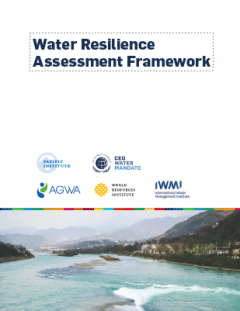
Climate change is driving many types of water challenges, including water scarcity and abundance, worsening water quality and shifts in timing of the hydrologic cycle. Specific guidance on how to understand system resilience and measure systematic changes and intervening actions can ensure a more resilient future.
This report presents a framework to facilitate a shared understanding of water system resilience and allow practitioners to develop common measurable goals and outcomes for stakeholder and resilience planning.
The Water Resilience Assessment Framework consists of four key steps: visualizing the system, developing a resilience strategy, testing the resilience strategy and evaluating.
